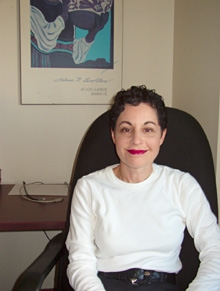Youth travel is still a rite of passage, says Vered Amit

Vered Amit
Photo by Lina Shoumarova
Ever since the 18th and 19th-century “grand tours” of Europe, travel has been considered an essential step in a young person’s transition to adulthood. Concordia anthropology professor Vered Amit and a colleague, Noel Dyck from Simon Fraser University, recently received a three-year $110,706 SSHRC grant to study this rite of passage.
“There is a tendency to represent youth travel as an interlude, an opportunity to have one last hurrah before you have to settle down to the world of 9 to 5,” Amit said in an interview. However, the rhetoric has shifted in recent years to include catchphrases like “training global citizens.”
“’Global’ enters this rhetoric a great deal and sometimes it is hard to understand what it actually means in terms of experience and life course,” Amit said. Deconstructing this type of language is a key component of the study.
Through interviews, fieldwork and documentary analysis, the two scholars will look at three kinds of programs recruiting students to travel abroad: international university exchanges, work exchanges like the Student Work Abroad Program (SWAP), and athletic scholarships. At this stage of the project, Amit and Dyck are compiling statistical data to shed light on the structural organization of these programs.
Athletic scholarships are overwhelmingly U.S.-oriented, Amit said. The U.S. has a tradition of supporting athletics on both the secondary and post-secondary levels, and Canadian students have seized this opportunity. Canadians represent a significant percentage of all foreign students enrolled in American universities on athletic scholarships.
English-speaking countries are especially preferred destinations for students in study and work exchanges. Among the most popular are Britain, Ireland, Australia and the United States.
Australia, in particular, has consistently promoted itself as the place to be for all sorts of youth travel, from university exchanges to the more leisurely backpack trips.
Amit and Dyck will also look at changes in the athletic scholarship programs in recent years. Once viewed as an opportunity for students of modest means, these scholarships have increasingly attracted middle-class applicants from Canada.
According to Amit, exchange programs tend to be oriented towards middle-class youth. In addition to the registration and visa fees involved, applicants are advised they need substantial financial resources to cover living costs, which in some countries like Britain or France are higher than they are here.
Even the students in the SWAP program need initial funds because they are not guaranteed a job in the country of their choice, just assistance in finding one.
This project is an extension of Amit’s previous research on internationally mobile professionals and migratory elites, a topic that she explores in her forthcoming book on elite cultures.
“I’ve been very interested in people’s sense of connection and belonging, in notions of stability and continuity, and in the sheer logistics of how people organize their most intimate social relationships when they are on the move,” she said.
Her studies increasingly suggest that people take for granted that mobility will be part of their working lives.
Amit said most of her class of undergraduate students responded with a resounding ‘yes’ when she asked them if they expected to change several jobs during their careers or to move to different locations for work-related reasons.
Vered Amit received her doctorate from Manchester University in 1984 and taught at Stirling University in Scotland before joining the Sociology and Anthropology Department at Concordia.